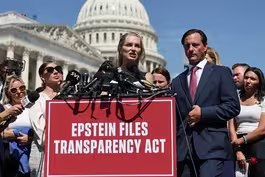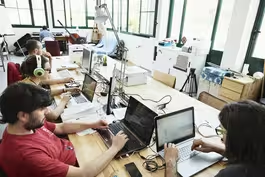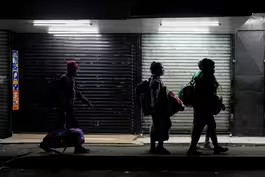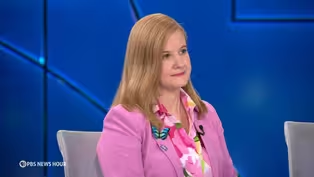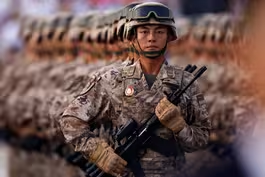
Climate refugees forced to adapt as rising sea swallows land
Clip: 9/3/2025 | 8m 36sVideo has Closed Captions
As rising sea levels swallow Bangladesh's land, its climate refugees are forced to adapt
Few countries in the world are considered more vulnerable to the impact of rising sea levels and climate change than Bangladesh, a nation of 175 million people squeezed into a landmass the size of Iowa. In partnership with the Pulitzer Center, Fred de Sam Lazaro traveled to Bangladesh to look at efforts to build resilience in the face of the escalating consequences.
Problems playing video? | Closed Captioning Feedback
Problems playing video? | Closed Captioning Feedback
Major corporate funding for the PBS News Hour is provided by BDO, BNSF, Consumer Cellular, American Cruise Lines, and Raymond James. Funding for the PBS NewsHour Weekend is provided by...

Climate refugees forced to adapt as rising sea swallows land
Clip: 9/3/2025 | 8m 36sVideo has Closed Captions
Few countries in the world are considered more vulnerable to the impact of rising sea levels and climate change than Bangladesh, a nation of 175 million people squeezed into a landmass the size of Iowa. In partnership with the Pulitzer Center, Fred de Sam Lazaro traveled to Bangladesh to look at efforts to build resilience in the face of the escalating consequences.
Problems playing video? | Closed Captioning Feedback
How to Watch PBS News Hour
PBS News Hour is available to stream on pbs.org and the free PBS App, available on iPhone, Apple TV, Android TV, Android smartphones, Amazon Fire TV, Amazon Fire Tablet, Roku, Samsung Smart TV, and Vizio.
Providing Support for PBS.org
Learn Moreabout PBS online sponsorshipAMNA NAWAZ: Few countries in the world are considered more vulnerable to the impact of rising sea levels and climate change than Bangladesh, a nation of 175 million people squeezed into a land mass the size of Iowa.
In partnership with the Pulitzer Center, Fred de Sam Lazaro traveled to Bangladesh to look at efforts to build resilience in the face of escalating consequences.
FRED DE SAM LAZARO: It is the most crowded space in the most crowded city on Earth by some rankings.
Tens of thousands who live in this slum settlement of Korail are so-called climate refugees, whose previous homes were on land that no longer exists.
JAHANARA, Climate Refugee (through translator): Our house was taken away by the river.
FRED DE SAM LAZARO: Sixty-five-year-old Jahanara - - she uses only one name -- moved here some two decades ago.
Her family's home was lost, like tens of thousands of others over the years, to erosion or, where on land, swallowed by a rising sea.
Jahanara scrapes by, earning $2 to $3 a day cleaning houses and selling scrap.
JAHANARA (through translator): I have lived a very difficult life.
I have worked hard.
I still work hard.
FRED DE SAM LAZARO: With three major rivers and hundreds of tributaries, most swollen by rising seas and melting Himalayan glaciers, no part of this low-lying country, coastal or inland, is spared.
I'm standing on an embankment along the Padma River.
It feels nice and solid, but until about four days ago, it stretched out further for another quarter-mile or so.
All of a sudden, it simply sank into the river, taking with it several homes and a few shops.
And the people here say it all happened in about 15 minutes.
ARIF MADBOR, Erosion Victim (through translator): I was at my father-in-law's house when I got a phone call.
FRED DE SAM LAZARO: Arif Madbor lost his family home.
ARIF MADBOR (through translator): When I arrived, I saw that many houses had gone under the river.
Our house had also been destroyed.
PARVAS HUSSEIN, Former Shop Owner (through translator): Now we are destitute.
FRED DE SAM LAZARO: Parvas Hussein owned a grocery shop here.
PARVAS HUSSEIN (through translator): The first thing we need now is a sustainable embankment, so people like us have a livelihood in the future.
FRED DE SAM LAZARO: For now, sandbags are all that's available to retain what land is left.
Many families will likely join informal communities like this one just up the river on a stretch of public land.
RUSHIYA BEGUM, Climate Refugee (through translator): No one gave us this land.
We were helpless.
So, we found this land and built a house here.
FRED DE SAM LAZARO: Rushiya Begum arrived here last year, escaping erosion that has displaced her three times before, she says, most recently sweeping away her land and most of her livestock.
RUSHIYA BEGUM (through translator): Our lives have been filled with hardship.
We cannot even afford sandals.
ATIQ RAHMAN, Executive Director, Bangladesh Center For Advanced Studies: The communities have learned to accept their realities, because they don't have the luxury of time.
FRED DE SAM LAZARO: Environmental scientist Atiq Rahman agrees with estimates that, by 2050, Bangladesh will lose 17 percent of its territory due to rising sea levels, including 30 percent of its agricultural land.
He says Bangladeshis are slowly finding ways to adapt.
ATIQ RAHMAN: You can do intellectual adaptation.
You can do physical adaptation.
You can do agricultural adaptation.
You can do water-based adaptation, all that.
MOHAMMED REZWAN, Founder, Shidhulai Swanirvar Sangstha: I was very fortunate to have a family boat that took me to schools, but not everyone.
FRED DE SAM LAZARO: So you went on a boat to school?
MOHAMMED REZWAN: Right, during the monsoon.
FRED DE SAM LAZARO: Monsoon floods routinely keep children out of school, says architect Mohammed Rezwan.
His solution was to bring school to the boat.
In 2002, he designed and launched the first flat-bottom boats to serve as primary schools.
Today, the fleet has expanded to more than 100 boats, serving across a swathe of Northwest Bangladesh, not just as schoolrooms, but also as libraries, clinics, playgrounds and training centers.
MOHAMMED REZWAN: We are trying to develop people's skills towards resilience.
It has high windows to let light and air in.
We train on sustainable, effective and climate-friendly farming techniques, focusing more on traditional knowledge of climate adaptations.
FRED DE SAM LAZARO: We visited this training session teaching women organic low-cost methods to protect their crops from pests.
MAHMUDA KHATUN, Agriculture Student (through translator): I get a good result using this trap to protect my eggplant field.
Flooding actually damages our crops, but the vegetables that we grow around our home, we can actually get good production.
FRED DE SAM LAZARO: Garden vegetables provide much-needed nutrition, and Rezwan's nongovernment group has encouraged people to try new ideas, like fish farms and raising ducks on the river.
However, the bedrock of this country's food security is rice.
Even though it naturally thrives in water, it too is susceptible to climate change.
Floods can wipe out a harvest, or a crop may not survive in soil that's become salinized with seawater.
We visited this seed bank run by BRAC, the world's largest nongovernment organization which began in Bangladesh.
Scientists here are developing hardier varieties of rice and other seeds.
FARUK HOSSAIN, Agronomist, BRAC: Flood resistance are available.
Some are drought-tolerant, saline.
FRED DE SAM LAZARO: Many of these farmers can only grow that kind of rice... FARUK HOSSAIN: Correct.
Correct.
FRED DE SAM LAZARO: ... in parts of the country.
FARUK HOSSAIN: That's right.
FRED DE SAM LAZARO: Because the soil has become so soggy with sea water.
FARUK HOSSAIN: Correct.
Correct.
Correct.
Soggy, yes.
ASIF SALEH, Executive Director, BRAC Bangladesh: We have to come up with solutions that are scalable and then figure out where the funding comes from later on.
FRED DE SAM LAZARO: BRAC CEO Asif Saleh says funding to scale projects has not materialized, despite commitments from rich countries, primarily responsible for climate change.
ASIF SALEH: Local organizations are probably getting about 4 to 6 percent of the funding that is coming in.
They have billions of dollars, but their bureaucratic processes make it impossible.
If you record all the promises that have been made over the last few years, calculate that, and look at how much money has gone to the ground, it's laughable.
FRED DE SAM LAZARO: That criticism of hollow promises echoes as well in Bangladesh's largest industry, textile and garment making, in which the country ranks second only to China's in size.
DAVID HASANAT, CEO, Viyellatex Group: So this factory emits almost 40 percent less carbon emission.
FRED DE SAM LAZARO: David Hasanat's four factories are among 258 that have earned the global LEED certification for being energy-efficient, using renewables and recycling wherever possible.
But Hasanat says there's no incentive for him or any other factory owners to follow suit.
Do your brands, do your customers reward you for being energy-efficient, for being environmentally sensitive?
DAVID HASANAT: Answer is no, definitely.
They don't give... FRED DE SAM LAZARO: You don't get paid any more?
DAVID HASANAT: No.
FRED DE SAM LAZARO: Most fashion brands and retailers may publicly proclaim their eco-consciousness, he says, but share none of the cost of adaptation.
Meanwhile, those most vulnerable must temper their expectations as they try to adapt.
RUSHIYA BEGUM (through translator): The one good thing is we are living on dry land, for now.
FRED DE SAM LAZARO: Down even to what passes for dry land these days, and how long Rushiya Begum can remain on it.
She'd just been served an eviction notice from the Bangladesh Bridge Authority.
The land is needed for a Chinese engineering company, pushing her once again to the edge of despair.
RUSHIYA BEGUM (through translator): If you don't allow me to stay, then I will have to move.
Or if you want to throw us into the water, you can throw our life into the water.
FRED DE SAM LAZARO: By 2050, it's estimated that climate change will displace another 20 million people in this country.
For the "PBS News Hour," I'm Fred de Sam Lazaro in the village of Alamkar Kandi (ph), Bangladesh.
AMNA NAWAZ: And Fred's reporting is a partnership with the Under-Told Stories Project at the University of St. Thomas in Minnesota.
Epstein survivors demand justice as Trump calls case a hoax
Video has Closed Captions
Clip: 9/3/2025 | 3m 1s | Epstein survivors demand justice in Washington as Trump calls case 'a Democrat hoax' (3m 1s)
How future workers will adapt as AI reshapes jobs
Video has Closed Captions
Clip: 9/3/2025 | 6m 57s | How the next wave of workers will adapt as artificial intelligence reshapes jobs (6m 57s)
Museum showcases the pets who have lived in the White House
Video has Closed Captions
Clip: 9/3/2025 | 5m 19s | Museum exhibit showcases the pets who have lived in the White House (5m 19s)
Rulings stall Trump policies, setting up Supreme Court fight
Video has Closed Captions
Clip: 9/3/2025 | 5m 19s | Trump policies stalled by series of rulings, likely setting up Supreme Court fight (5m 19s)
'This is not a political issue,' Epstein survivor says
Video has Closed Captions
Clip: 9/3/2025 | 7m 51s | 'This is not a political issue, this is a crime,' Epstein survivor says (7m 51s)
What China's military parade and diplomacy mean for U.S.
Video has Closed Captions
Clip: 9/3/2025 | 9m 42s | What China's display of military might and diplomacy mean for the U.S. (9m 42s)
Providing Support for PBS.org
Learn Moreabout PBS online sponsorship
- News and Public Affairs

FRONTLINE is investigative journalism that questions, explains and changes our world.

- News and Public Affairs

Amanpour and Company features conversations with leaders and decision makers.












Support for PBS provided by:
Major corporate funding for the PBS News Hour is provided by BDO, BNSF, Consumer Cellular, American Cruise Lines, and Raymond James. Funding for the PBS NewsHour Weekend is provided by...
